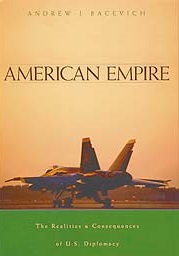 This information has been archived for reference or research purposes.
This information has been archived for reference or research purposes.
Archived Content
Information identified as archived on the Web is for reference, research or recordkeeping purposes. It has not been altered or updated after the date of archiving. Web pages that are archived on the Web are not subject to the Government of Canada Web Standards. As per the Communications Policy of the Government of Canada, you can request alternate formats on the "Contact Us" page.
BOOK REVIEWS
AMERICAN EMPIRE: THE REALITIES AND CONSEQUENCES OF U.S. DIPLOMACY
by Andrew J. Bacevich
Cambridge, MA: Harvard University Press. 301 pages, $47.50
Reviewed by Philippe Lagassé

Since the mid-1990s, extensive debates about globalization and unparalleled American military strength have produced a wealth of new literature about the emergence of a Pax Americana. Notwithstanding the works of Noam Chomsky and others of his ilk, however, discussions of American supremacy (such as those offered by Charles Krauthammer, Joseph Nye and Michael Mastanduno) have avoided analyses of American policy, choosing instead to focus on the structural characteristics of the unipolar international system. In marked contrast to this trend is Andrew J. Bacevich’s book, American Empire, which provides a provocative and critical examination of the United States’ post-Cold War grand strategy. Aided by the insights of two previously discredited historians, Charles A. Beard and William Appleton Williams, Bacevich shows how the unquestioned domestic desire for greater prosperity has prompted the once disengaged republic to adopt a position of global economic and military dominance. Indeed, as explained by Bacevich, this push for empire was clearly seen in the policies of both the first Bush and the Clinton administrations, demonstrating that the United States’ imperial aspirations have been deliberate, and that they are shared by ideologically diverse members of the American foreign policy elite.
The keystone of Bacevich’s argument is that American imperialism is guided by the principle of ‘openness’. Economically, policies of openness serve to secure the financial stability of American citizens. This has been achieved through an unwavering American dedication to open markets, capitalism and free trade in the post-Cold War era. Moreover, as presented by Bacevich, this drive to expand the global market is by no means benign. While the benefits of globalization are held by its promoters to be transnational, the country that has gained the most from the increase in world trade is the United States. Thus, it is not surprising that foreign economic policy rose to the forefront of American international affairs during the Clinton administration. Politically, openness further aims to spread American liberal democratic values abroad. Though clearly not a new American foreign policy goal, the expansion of liberal democracy in the post-Cold War era is also shown by Bacevich to be a servant to domestic economic demands. Rather than being messianic in character, increasing the number of liberal democracies in the world can be linked to a search for new trading opportunities, since liberal democracy tends to foster market capitalism. Using the concept of openness, Bacevich thus skilfully ties the Clinton administration’s policy of democratic enlargement to the construction of an American economic empire.
Alongside his study of openness, Bacevich also shows the United States to be a militaristic empire. Contrasting past precedents, the United States military did not disintegrate in the aftermath of the Cold War. In fact, the United States not only kept a tremendous military force after the fall of its main adversary, the Soviet Union, American officials also dedicated themselves to the maintenance of an unequalled military machine. Moreover, like the emphasis on economic expansion, the intent to retain America’s military dominance was little debated among the political elite, and was generally embraced by the citizenry. In and of itself, military might does not make an empire, however, as Bacevich indicates, American officials have made unprecedented use of the military power at their disposal since the end of the Cold War. Indeed, armed with detailed case studies of the first Gulf War, Somalia, Haiti, Bosnia, and Kosovo, Bacevich persuasively argues that the United States follows a markedly militarized foreign policy.
Finally, in what reads as a rushed attempt to update his text, Bacevich outlines how American ascendancy was unshaken by the events of September 2001, and how it is being further advanced in the struggle against catastrophic terrorism. Not only has the war on terror allowed the administration of President George W. Bush to explicitly use the military power of the United States to introduce democracy and American values into rogue and failed states, but the threat posed by al Qaeda has furthered the cause of maintaining American military supremacy.
American Empire is an important contribution to contemporary studies of American foreign and defence policy. Through his examination of the strategy of openness Bacevich reminds us that empires, like all political structures, adapt themselves to the peculiarities of the age in which they appear. Today, an empire need not be a purely military phenomenon; information-age globalization allows for more inconspicuous means of exerting pressure and influence. However, as Bacevich demonstrates, the American empire has not lost its military attributes. Despite the absence of a peer competitor, the United States has continued to enhance its military strength. And, although one may question the revolutionary nature of American defence transformation, it cannot be denied that the United States intends to possess the world’s most capable, flexible and lethal military for as long as it can. Coupled with the militarization of American foreign policy outlined by Bacevich, the strength of the American military and America’s global economic interests may therefore lead to new “wars for the Imperium” in the future.
Polemical in its tone, at times repetitive and unlikely to convince sceptics, American Empire is nonetheless a highly recommended read.
Philippe Lagassé recently graduated with an MA in War Studies from Royal Military College. He is beginning a doctorate in political science at Carleton University in the fall of 2003.






